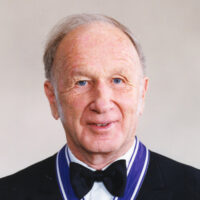
The 1991 Kyoto Prize Workshops
/ Meteorologist
Earth and Planetary Sciences, Astronomy and Astrophysics
1991
11 /12 Tue
13:00 - 17:25
Place: Kyoto International Conference Center
Address:Takaragaike, Sakyo-ku, Kyoto 606-0001 Japan

Edward Norton Lorenz
Meteorologist
A meteorologist who established the theoretical basis of weather and climate predictability, as well as the basis for computer-aided atmospheric physics and meteorology. He made his boldest scientific achievement in discovering “deterministic chaos,” a principle which has profoundly influenced a wide range of basic sciences and brought about one of the most dramatic changes in mankind’s view of nature since Sir Isaac Newton.